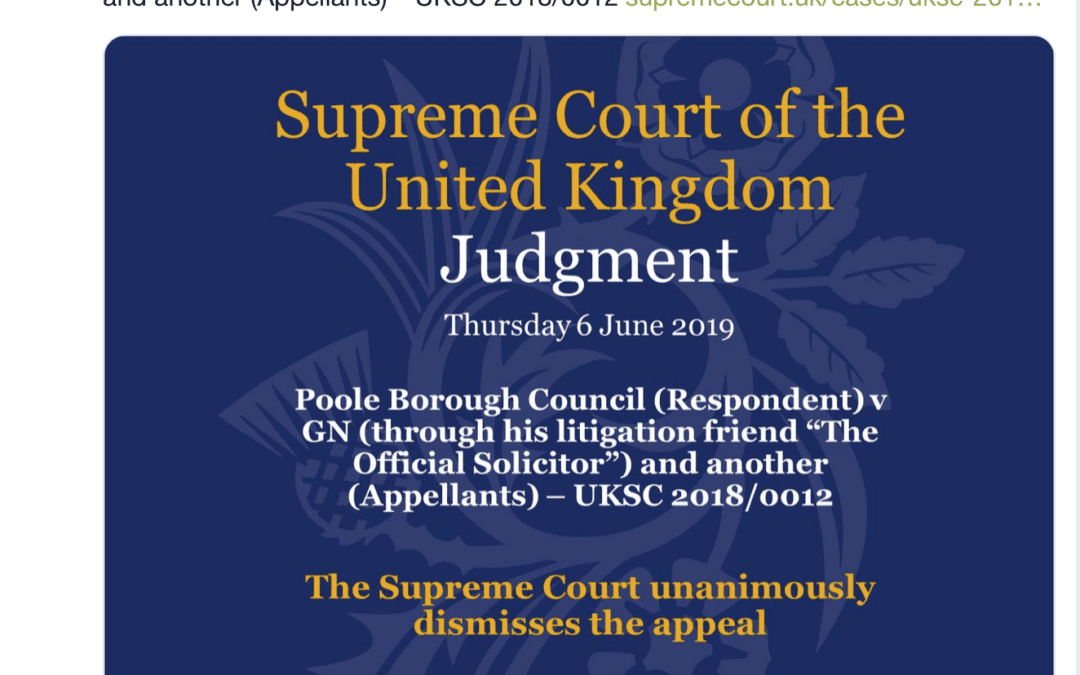You can tell this was likely to be an important case because there are five ‘interverners’ – organisations that have an interest, in principle, in the outcome – in this particular case, from a human rights and children’s rights perspective. The applicants were two siblings and the defendant was a local authority, Poole Borough Council. The background is described on the Local Government Lawyer website here.
Briefly, the case arose because a child ‘in need’ because of his disabilities (section 17 Children Act 1989) had been subject to harassment and intimidation by neighbours and it was then claimed that Poole BC owed him a duty of care to protect him from harm. They had failed to do this because they should have removed the children from their mother and accommodated them somewhere safer, it was argued.
The Court of Appeal rejected the children’s claim because:
- Making local authority children’s services potentially liable in negligence would complicate decision-making in a difficult and sensitive field and potentially divert social workers into defensive decision-making.
- Generally, there is no liability for the wrongdoing of a third party (in this case the anti-social family), even where that wrongdoing was foreseeable.
- It is not effective, or just, to single out one agency of the state (here, children’s services) for liability as against the other agencies. The claim was essentially a criticism of the housing functions of the local authority.
This Court of Appeal decison raised a lot of concern because it suggested that local authority social services could never be liable for negligence when children were harmed by a third party, even if social workers knew they were at risk.
The Supreme Court decision, published today has reassured lawyers and children’s organisations because – although the Court of Appeal decison was correct on the facts – it ‘should not be understood as meaning that an assumption of responsibility can never arise out of the performance of statutory functions.’ [para 72]
Lord Reed said:
‘In the light of the cases which I have discussed, the decision in X (Minors) v Bedfordshire can no longer be regarded as good law in so far as it ruled out on grounds of public policy the possibility that a duty of care might be owed by local authorities or their staff towards children with whom they came into contact in the performance of their functions under the 1989 Act… [para 74]
In this case, housing the family had not meant that Poole Council had automatically assumed responsibility for the children. However, this new judgment confirms that there can be other, even similar, circumstances where such a responsiblity is taken on by the council, who would then owe the children a duty of care.
The Supreme Court press summary focuses on the family in Poole but Article 39 has published a short explanation of the wider implications here.

It is obvious that local authorities have a ‘duty of care’ to children when working with a family on a voluntary basis. In this case the authority worked supportively with the family and made use of the social work tool of the child protection plan, adopting a multi-agency approach, and had apparently recognized its duty of care to the children. However, ‘working supportively’ can sometimes include putting pressure on other services to make them fulfill their legal responsibilities.
Social workers need to have a sound grasp of the meaning of this judgment. I have written about the problems that can arise if they do not understand their ‘duty of care’ when carrying out their child protection functions. Although the situation was different because the children were in care the important principle of ‘duty of care’ should not be forgotten: Our Duty of Care to Children https://radical.org.uk/barefoot/dutycare.htm
Local authority social workers are a joke and completely unaccountable. Arrogant, discriminatory, abusive, damaging, incompetent.
Hackney particularly are atrocious from top to bottom.
They do far more harm than good.
Have a look at community care and the comments. Almost all social workers feel they are above the law and superior to service users.
Read Social Work England professional ethics and guidelines then then show me one LA social worker who abides by them.
I’ve met many social workers and they’re either sadists or morons or both.
They are dangerous people.